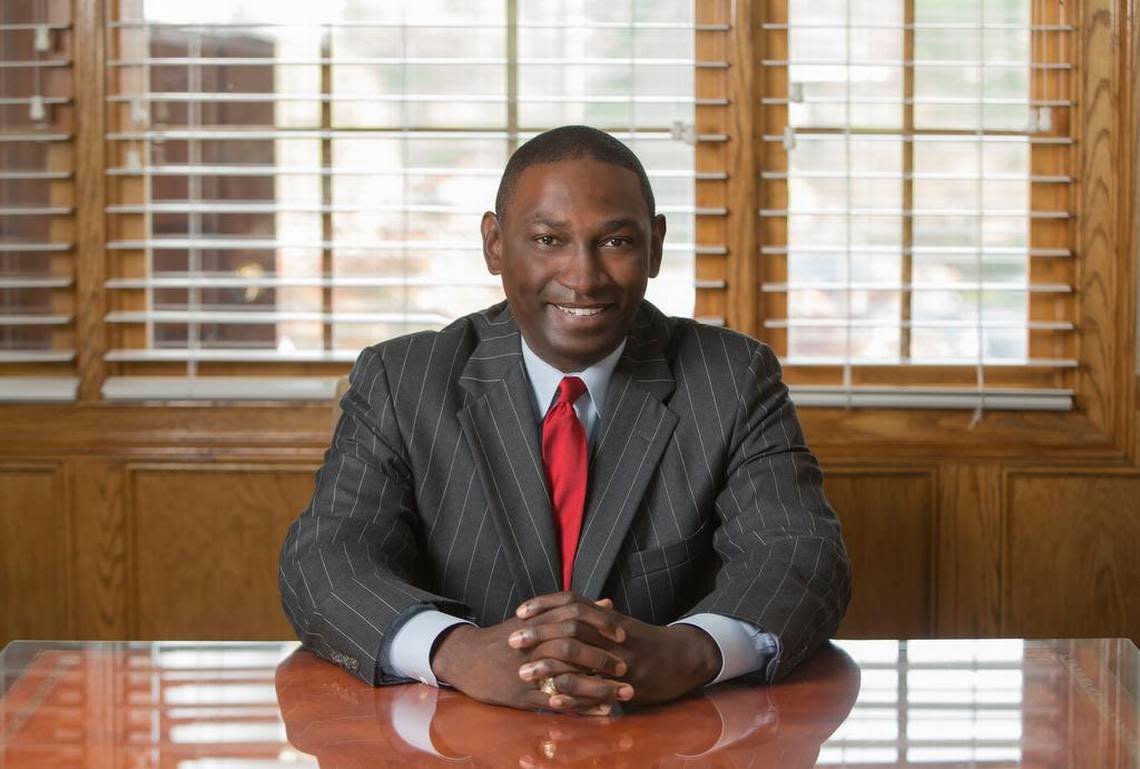Stanley Myers, top South Carolina lawyer and former star Citadel quarterback, dies at 47

- Oops!Something went wrong.Please try again later.
Stanley Myers, a popular and highly respected Midlands attorney, died Wednesday, He was 47.
Myers, a star quarterback at The Citadel who graduated in 1998, collapsed Wednesday morning while walking his dog and had been jogging earlier, said Lexington County coroner Margaret Fisher.
The cause of death has not been determined.
At the time of his death, Myers, who served a stint in Afghanistan with the S.C. National Guard, was a lieutenant colonel and the first African American Judge Advocate military judge with the McEntire Joint National Guard Base. He was a name partner at Moore Bradley Myers, a West Columbia multi-specialty law firm.
Myers also served on The Citadel’s Board of Visitors, the college’s governing board, where he was chairman of the legal and athletics committees.
Before The Citadel, Myers was quarterback of the Swansea High School football team when it won state championships, friends said. Friends also said that Myers was instrumental in establishing mentorships for young people in the Swansea area.
Later Wednesday, The Citadel posted a letter about Myers from its president, General Glenn M. Walters, on its internet home page.
“During his time in the Corps of Cadets, Stanley wore the number 16 for the Bulldogs,” Walters wrote. “He completed his athletic career at The Citadel having started 43 out of 44 games as quarterback. He is the only player in Citadel history to ever throw for 3,000-plus yards and to rush for 2,000-plus yards.”
Myers also was a member of the American College of Trial Lawyers, a group of the nation’s top attorneys that limits its members to the top one percent of lawyers in a state, said Columbia attorney Debbie Barbier and chairman of the South Carolina group’s state committee. “He was just a complete class act.”
“Stanley was my best friend,” said longtime friend and fellow Citadel graduate David Pascoe, the solicitor of South Carolina’s first judicial circuit. “We talked every day. He was probably the least-known legal giant in our state, probably because he never went on social media to tell people how great he was.”
Pascoe said every Christmas, Myers would give out dozens of bicycles and other presents to children in his community of Swansea in Lexington County. He had also started a barbecue restaurant that employed family members, Pascoe said.
I.S. Leevy Johnson, a Columbia lawyer and one of the first African-American to serve in the S.C. Legislature in the 20th century, said, “Stanley was the total package — he excelled with his family, the judicial system and community service. It is a great loss; he contributed so much to the community.”
State Judge Robert Hood, one of Myers’ Citadel classmates, said, “His dedication to the law and his clients is only matched by his devotion as a husband and a father. He is the epitome of an amazing light both in and out of the courtroom.”
During his Citadel years, Myers fought to take the Confederate flag down from the college chapel, Hood recalled. “He was always there for you. He was always fighting for his clients.”
Myers’ clients ranged from former Chester County Sheriff Alex Underwood, who was sentenced to federal prison last year after being convicted of corruption, to a man accused of exploiting workers brought from Mexico. In 2016, Myers and fellow attorney Xavier Starkes, also a Citadel graduate, both working pro bono, convinced a federal jury to award $8,100 to a S.C. Department of Corrections inmate who claimed he had brutally beaten by guards.
Jake Moore, the senior partner in Myers’ law firm who hired him, said, “I loved Stanley Myers with all my heart. He was like a son to me and one of the most decent human beings I’ve ever met.”
Moore said he hired Myers when Myers was still at The Citadel and helped him get into law school. “He worked for me in the summers, and he was easy to teach, incredibly gifted and brilliant. He never met a stranger.”
When 9/11 happened in 2001 and the U.S. was getting ready to invade Afghanistan, Myers was in the National Guard. Moore said he tried to talk him out of going to fight.
“Arrangements could have been made for him not to go to Afghanistan, but he told everybody that he would not feel right about staying at home while his battalion went,” Moore said. “So he went for a year.”
When Myers returned and his plane landed at the Columbia airport, Moore said, “We had 50 people out there welcoming him. It wasn’t long after that that we made him a partner.”
“Stanley was very well-respected as a defense attorney and a great guy,” said Jack Duncan. “Our paths usually crossed in Swansea magistrate’s court, where he was a legend. He knew everybody down that way. He was on top of everything. I saw him in federal court, state criminal court, just everywhere. You’d walk in any courtroom, and there was a chance Stanley would walk in. He had a very varied practice.”
News of Myers’ death ricocheted around social media Wednesday.
“It seems ridiculously unfair that one of our very best is gone,” wrote Theile McVey, a Columbia personal injury lawyer, on X, formerly known as Twitter.
Eric Bland, a Columbia area lawyer representing plaintiffs in the Murdaugh financial fraud cases, posted on X, “Tough tough news. One of my closest friends and wonderful father, husband, lawyer, athlete and a man who fought for our country ... tragically died this morning. His name was Stanley Myers.”
Attorney General Alan Wilson, who also is in the National Guard, posted, “My dear friend Stanley Myers passed away this morning. I’m heartbroken... We lost a good one far too early.”
This story will be updated.

